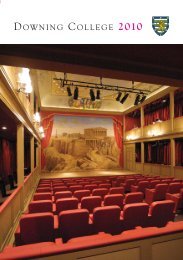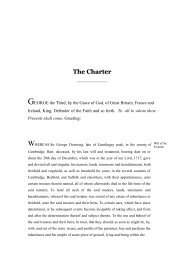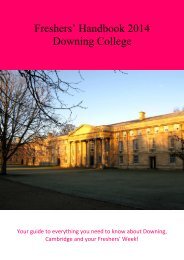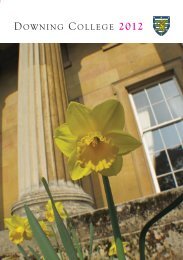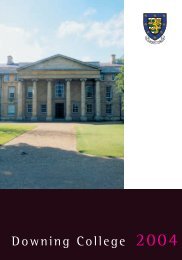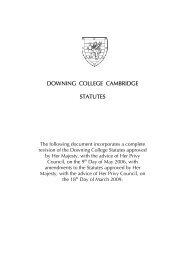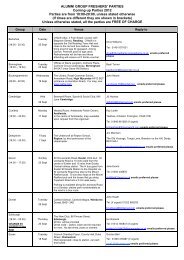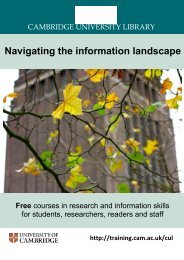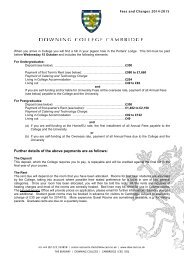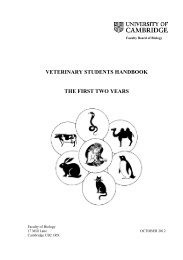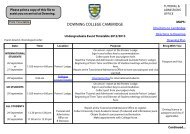211075 Downing Record 07 - Downing College - University of ...
211075 Downing Record 07 - Downing College - University of ...
211075 Downing Record 07 - Downing College - University of ...
You also want an ePaper? Increase the reach of your titles
YUMPU automatically turns print PDFs into web optimized ePapers that Google loves.
James Norman Birch (Fellow Emeritus)Norman Birch died on October 1st 2006. The Chaplain conducted his funeral inthe Chapel on Friday, 13th October.Norman was born in Ayrshire, in 1919, and was the eldest <strong>of</strong> four brothers.He attended a village primary school and then went to secondary school at theAyr Academy. It was a tumultuous time to grow up: he’d been born soon afterthe end <strong>of</strong> the First World War, and war was again approaching as he enteredadulthood. Norman volunteered for the Royal Engineers at the outbreak <strong>of</strong> theSecond World War, and he began a very distinguished period <strong>of</strong> military service.As a young <strong>of</strong>ficer, he started to display the great talent for leadership which heshowed through his later career. He was promoted to captain and then major atan unusually young age. Early in the war, he was with the British ExpeditionaryForce in France, and was part <strong>of</strong> the Dunkirk evacuation. Later, he was sent to theFar East and posted to Burma. In the army, Norman learned to lead men, some <strong>of</strong>whom were considerably older than him. He earned the trust <strong>of</strong> his soldiers, andinspired them to honour the trust that he placed in them. Another <strong>of</strong>ficercommented that ‘his men would follow him to the far side <strong>of</strong> the moon’. As wellas adventures around the world, wartime also included romance for Norman. Itwas at this time that he met Monique in Southampton. She had come to Englandas a refugee from Belgium, and was also in the army, working on an anti-aircraftbattery. When the war was over, Norman and Monique were married, and he tookher back to Scotland where they went to live in Newton Stewart. And it was therethat their three children were born – Karen, Katherine and Derek. Norman nowput his engineering and leadership skills to work as a civilian. He became astructural engineer, specialising in foundations and piling. This work brought himsouth to England. In 1951, the family moved to Woodford Green, in Essex, andthen in 1965 to Cambridge. Norman worked for companies including Mowlem,Rattee and Kett, and French Kier. He was always hard-working and meticulous.He had both an impressive technical knowledge, and a great ability to deal withpeople. He kept a careful eye on all the details <strong>of</strong> each building project, and onthe workforce. He was frequently to be seen out and about on the site, and knewhis workers well. He was good at resolving conflicts and dealing with fraughtsituations, and became a qualified arbitrator. He showed unfailing courtesy,consideration and gentleness. But he also had a strong sense <strong>of</strong> the right path totake, and could be very firm with any who were failing to pull their weight. In allthings, he showed clear wisdom and sound common sense. In 1981, Norman’scareer took a different direction when he became Domestic Bursar <strong>of</strong> <strong>Downing</strong>.He loved the <strong>College</strong> and he modestly said that he applied with no expectation<strong>of</strong> getting the job. He himself had gone to war at the age when he might have68



